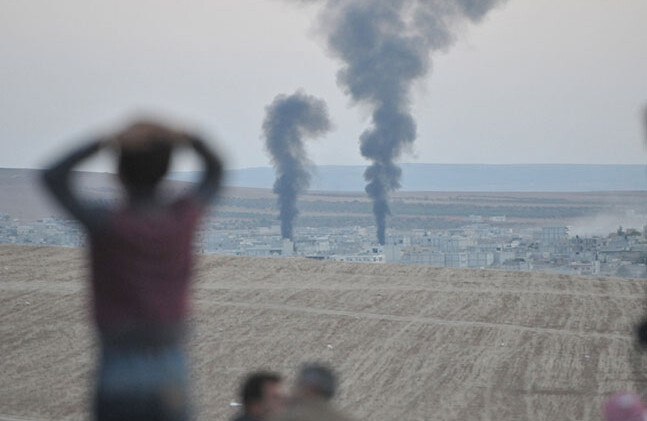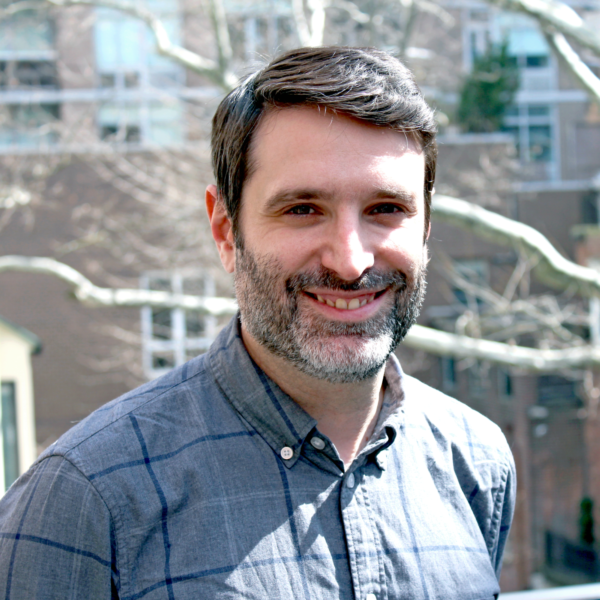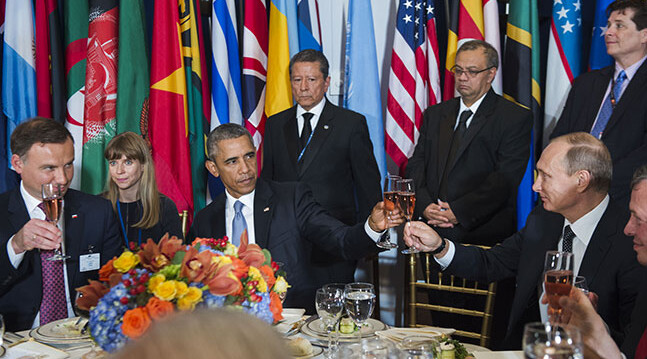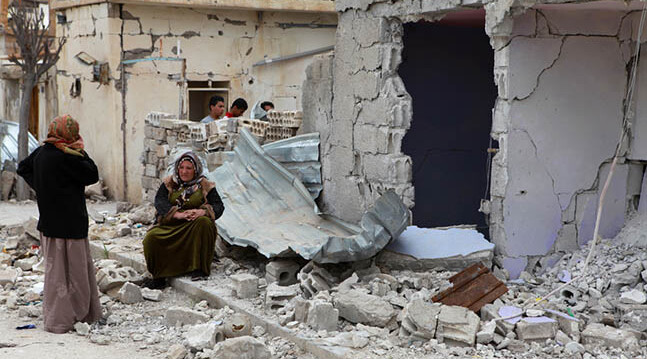The good news is that ISIL has lost one-third of the key areas that it took over, both in Iraq and Syria, says Castleberry. But the Russian intervention in Syria has complicated things; she explains just how.
ALEX WOODSON: Welcome to the Carnegie New Leaders podcast. My name is Alex Woodson. Carnegie New Leaders is a membership program for young professionals who wish to engage in a dialogue on ethics in international affairs. Through a series of formal and informal gatherings, CNL members interact with business professionals, policymakers, social innovators, and scholars who are changing the way we approach global ethics in the 21st century.
Today we have Asha Castleberry returning to the podcast. Asha is a former Carnegie New Leader. She is a U.S. Army veteran, adjunct fellow for the American Security Project, and a member of the Truman National Security Project.
Asha, thank you for coming today.
ASHA CASTLEBERRY: Thank you, Alex.
ALEX WOODSON: In July when you were last here, we talked about the need for Iraqi unity in the fight against ISIL [Islamic State of Iraq and the Levant]. You shared some insights from your time in Iraq and Kuwait, working with the Iraqi Security Forces and the Ministry of Defence in Baghdad in this conflict. Just to get started, what is the status of the fight against ISIL today, with the United States and the coalition that has been built up?
ASHA CASTLEBERRY: With regards to countering Daesh, what we call it in the region, or ISIL, they are losing ground. What was reported recently from USG [United States government] is they have lost one-third of the key areas that they took over both in Iraq and Syria. So that is some sort of progress.
But the recent situation with regards to Russian intervention in Syria has kind of complicated current operations there right now.
ALEX WOODSON: Can you just speak a little bit more about that? What does Russia's involvement really mean for the military in the region? We keep hearing that this makes the fight more complex. But what does that actually mean on the ground for American troops and for other coalition forces in the area?
ASHA CASTLEBERRY: It definitely provides some sort of confusion and a greater need for deconfliction, and also puts us at an operational risk. We have air assets flying in Syria. That is part of the air campaign. If you have a lack of deconfliction going on in Syria, where our air assets are located, as well as Russia's air assets doing airstrikes at the same time, there is a possibility of vulnerability going on. So it definitely complicates operations. That is a big concern.
It also reminds me, when we were also working with Iraqis countering ISIL in Iraq, you had Shia militias located in Iraq as well. So we had to deconflict with them, because they are not part of our operations there. They are definitely affiliated with Iran.
On a strategic level, it also tells us how much Russia really supports Syria and supports the al-Assad regime. I am not sure if you guys are tracking this, but prior to conducting airstrikes, there were some discussions between the Obama administration and Russia that they were going to be more involved in the fight, but definitely countering Daesh, or countering ISIL. But that was not the case afterwards.
ALEX WOODSON: Russia is involved in Syria and they have also, we have heard, signed an intelligence-sharing agreement with Iraq.
ASHA CASTLEBERRY: Yes, absolutely, which is also shocking to me. That even complicates current operations for us in Iraq. I cannot really envision where Iraqis are actually going to be doing both intel sharing with us, the 65-man coalition, as well as with the Russians. That definitely brings in a different spin to it and somewhat overwhelms current operations on the battlefield.
ALEX WOODSON: One thing that I find kind of interesting is that Iraq seems to be welcoming this agreement. I was reading a Reuters story this morning in which an Iraqi official said, "We might be forced to ask Russia to launch airstrikes in Iraq soon. I think in the upcoming few days or weeks Iraq will be forced to ask Russia to launch airstrikes, and that depends on their success in Syria."
So this is something that Iraq wants. It seems like Iraq hasn't been completely happy with the U.S. involvement so far. What do you say to that, when Iraq is supposed to be our partner in the fight against ISIL, Daesh, and they are saying publicly that they want Russia, a country that we don't really see eye to eye with, to help out in the fight?
ASHA CASTLEBERRY: With that situation, I think the Iraqis are getting already intel from the Iranians. Iran has a lot to do with what kind of feedback they are getting from Russia. I also came across some media reports that Iraq was pretty impressed with what the Russians or the Syrians were providing them, with the little coalition that they have between Syria, Russia, and Iran. They were impressed with the intel reports that they are getting from them.
I think with Iraq, because they are so desperate right now to take over their country, because over one-third of their country is controlled by ISIL, I think they are just, as far as right now, very desperate and trying to utilize anything they can to get their country back in order. It is not necessarily that they are not satisfied with the 65-member coalition that is supporting them right now. They are just trying to exhaust all their options to counter the threat.
ALEX WOODSON: Are there some ways that Russia's involvement could be positive for the fight? They have a huge military. They are very well-trained, it seems like. They are a lot closer geographically. They have intelligence, whether you want to believe it or not. Are there positives that could come out, maybe with greater coordination between American and Russian efforts and coalition efforts?
ASHA CASTLEBERRY: Yes, in terms of better synchronization with the 65-member coalition against ISIL, absolutely. If they are all targeting Daesh, that is when it works.
But when you are doing something a little bit different, where you are targeting the Syrian rebel groups, where we are arming them—the United States as well as the Qataris and the Saudis are arming the Syrian opposition—that is where it makes it very complicated with our strategy. That is the problem right there.
But when it comes to countering ISIL, it definitely is complementary to our operations, especially if it is all synchronized.
ALEX WOODSON: When Russia comes out and says that they have hit all these ISIL targets in Syria, and then Americans, Europeans, or other sources are saying, "No, they are actually hitting these rebels that have been backed by coalition forces," as someone who knows the situation much better than your average person, what do you think when you hear these reports? Should we just not believe anything that Russia is saying, or is it a little more nuanced than that?
ASHA CASTLEBERRY: We should definitely not believe what Russia is saying, especially if we are looking at the assessments in the battlefield. But if you look at Russia historically, they are known to report something in the media and then do something exactly the opposite. We saw that play out with Crimea. So I am not surprised that behavior is going on. In the West, many countries know that that is their behavior overall.
To address the situation there are several solutions that you can look at. Now that this is going on, the situation needs to be addressed. If Russian aggression persists, we have to be a little bit more tough on Russia, because right about now they are killing innocent lives and also messing up the strategy by targeting Syrian opposition groups.
The situation as far as targeting al-Raqqa, which is an ISIS stronghold—yes, that is complementary for our operations. But the bulk of it is towards the western part of Syria, where it is definitely complicating operations for us.
ALEX WOODSON: You just mentioned if Russia continues like this we have to get tough on them. What does that mean exactly?
ASHA CASTLEBERRY: There are things to consider right now. There is a new argument that is out there, considering doing a no-fly zone, where you are focusing on pressuring the capital, Damascus, and conducting operations there, like how we did with Libya, and making sure that we have a regional agreement as far as approaching a no-fly zone and making sure there is no air capabilities that are flying in that area, especially with Russia.
Also establish a refugee safe zone. Some policy experts are looking into possibly utilizing northern Syria for that. That is one way to get a little bit more tough.
And then also considering utilizing or sending ground troops—in my own opinion, not necessarily U.S. troops, but building some sort of regional force, like what we heard in the 2016 Republican debate, sending Arab boots on the ground. That is one thing to consider.
It is their region. They do a lot of readiness exercises together where they conduct different exercises. So they have the capability to counter this threat, and I think that they might have to take the lead on ground operations if Russian intervention persists.
ALEX WOODSON: Another term that I have heard come up recently is the term "proxy war" in this conflict. You have heard it in the context of Saudi Arabia and Iran, but now you are hearing it in the context of the United States and Russia. Are you concerned, or are people that you speak with concerned, that this already pretty bad conflict that has already spilled over different borders could get even worse with Russia's involvement?
ASHA CASTLEBERRY: That is one thing I will say that the Obama administration is trying to avoid, getting into a proxy war. Then there are some that are saying, "Oh, it is already happening."
But one way to prevent that, which I think is the best method of addressing this situation—as far as diplomacy, it is the best method of approaching the situation—is expediting the political process that is going on there and reaching peace negotiations and calling for a ceasefire. That is a great way to avoid the international community going into a proxy war.
Some say it is going on and some say it is not. But that is something definitely the Obama administration is trying to avoid.
ALEX WOODSON: Just speaking more about the region, one country that we haven't really talked too much about is Iran. They definitely have a big role in this. Where do they fit in with all of this? They have ties to Russia. They are part of the intelligence-sharing agreement with Iraq and Syria. How does Iran fit into the fight against ISIL right now?
ASHA CASTLEBERRY: Of course, Iran has a relationship with Syria, so by Russia going into Syria it definitely complements Iran's support for Syria. I know for sure that the Iranians have actually sent in ground troops to beef up the al-Assad regime and are working very closely with Russia right now. Iran also views Syria, just like Russia does, as far as trying to help the al-Assad regime so it can secure their equities or their influences in the region.
ALEX WOODSON: Another thing that we talked about in July was the involvement of the Gulf States, like Kuwait, Qatar, United Arab Emirates. What is the status of them right now in the fight against ISIL? I remember when we were talking that they were a pretty big part of the fight, but not something that a lot of people were talking about. What are some insights that you can share about how the Gulf States are involved in the fight right now?
ASHA CASTLEBERRY: Unfortunately, when the Yemen crisis happened, the contributions towards the counter-ISIL mission kind of trickled down or they didn't provide enough, because they were too busy countering the Houthis in the Yemen mission. Now the Yemen mission is coming down to an end, but they are still involved. But they are also getting a little bit more involved in the counter-ISIL mission.
I think now is the time to definitely beef up the contributions. I know that as far as with Saudi Arabia, as well as the Qataris, they have provided weapons to the Syrian opposition. Now that they see that the Russian airstrikes are targeting the Syrian opposition, it definitely disappoints them, to the point where they have condemned the Russian airstrikes. They are also looking into ways of how to counter Russian airstrikes due to what has recently happened.
ALEX WOODSON: What are some of those ways? You said that they have condemned the Russia airstrikes. But is there anything more tangible that they are thinking about doing or that they can do?
ASHA CASTLEBERRY: The only thing I know is that they are working very closely with the United States to put together those ideas of what they can do as far as countering Russian aggression.
But I believe that they should definitely get with all the Arab countries, especially—and this was by design promoted by Egypt—to design some sort of regional force and think about how to intervene in terms of supporting the Syrian opposition. My recommendation to them is to definitely activate and look into how to intervene into the situation in Syria, with the Egyptians or the Saudis taking the lead in that effort.
ALEX WOODSON: One thing I also want to touch on—right before the podcast started, you said that you were just worried about the people that you know there because of the Russian involvement. Can you speak a little bit about what that really means, what it really means on the ground, to have Russian jets in the mix now, and maybe ground troops? It may seem obvious, but how does that really make it a more dangerous situation for diplomats, for special forces, for everyone that is involved with the coalition and the U.S. efforts?
ASHA CASTLEBERRY: As mentioned before, I cannot stress how important it is to deconflict the situation. Our campaign is an air-led campaign. We have air assets in the Syrian airspace. That definitely complicates what is going on with us.
To actually see the Russian airstrikes coming through is just not cool, for a lack of term. Or just having a Russian general come to you at the embassy Baghdad, where I have been before, and saying, "Hey, now we're going to conduct airstrikes," definitely jeopardizes the lives of those who serving out there on the coalition.
Another risk, too, is that we also have where Russians are actually flying into the Turkish airspace, which is another problem as well, because they are a very important piece to this as far as countering the threat in Syria. It definitely complicates matters, especially for those who are part of the coalition.
ALEX WOODSON: It is interesting. The United States and a lot of other Western countries haven't really agreed with Turkey on a lot of issues, but it seems like we are very much in agreement with them on this, that Russia's involvement is making the situation a little more complicated.
ASHA CASTLEBERRY: Yes.
And I would like to also add that we have AA sites, advise and assist, with the Iraqis. So we are helping the Iraqis in Iraq. For Russia to actually consider doing airstrikes in Iraq while we are doing advise-and-assist at BPC [battle projection center] sites, that really, really puts people at risk and there is a greater need for deconfliction.
ALEX WOODSON: Just to wrap up here, just looking a little bit big-picture, what do you think are some solutions moving forward? The ultimate goal is to just have no conflict in Syria and Iraq right now and to get ISIL out of there. What are some big-picture solutions that you think about moving forward, maybe some that aren't even completely practical?
ASHA CASTLEBERRY: I am really big on diplomacy. So I do like the proposal where we would think of a way of coming to a ceasefire between the Syrian opposition as well as with the al-Assad regime, to come and do some sort of peace negotiations, and have everybody around the table, even Iran and Russia, to help conduct those peace negotiations. So have a ceasefire, as well as expediting to some sort of peace process.
Evidently, because of what is going on, because we are kind of falling behind in that, we are losing time in making sure we can put together some sort of effective peace process in Syria.
But if Russia continues as far as their intervention and it persists, the U.S.-led coalition will have to get tough. There is one proposal out there for, as mentioned before, the no-fly zone, possibly send in ground troops, but have the regional force take the lead on that, those that are in the area, like the Turks, as well as the Saudis, the Egyptians, all the Arab countries, to take the lead in that.
But we will have to get tough if their behavior persists. So it can go either way. Time will tell.
ALEX WOODSON: It is great that you mentioned a diplomatic solution. That is the result that I think everyone wants to see. Hopefully, we can see some progress towards that in the near future.
ASHA CASTLEBERRY: Yes.
ALEX WOODSON: Thank you again very much for coming.
This was Asha Castleberry. My name is Alex Woodson. You can find this podcast on iTunes and carnegiecouncil.org. Thank you very much.




